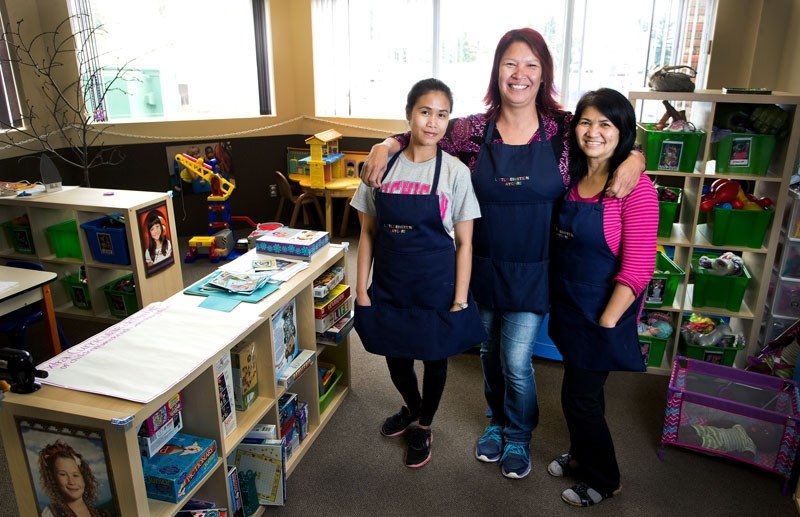As the provincial NDP goes full steam ahead with its minimum wage increases, another campaign promise, this one broken, is compounding the already high cost of childcare in the province.
Seema Passi, owner of Kids Haven Childcare, was forced to increase fees by $30 in October, when the minimum wage was raised from $10.20 to $11.20 per hour. With 28 children enrolled in the St. Albert daycare, that doesn’t even cover cost of raising each of her six employees (including some higher wage earners) by a dollar.
She’s about $2,400 short, not to mention how the increased cost of groceries and rent have added to the operational costs of her business.
“How much can you keep raising your fees before parents decide they’re just going to stay home?” she asks.
Passi hopes the NDP will hold back its three-year roll-out of the $15 minimum wage by 2018. But with Premier Rachel Notley and other cabinet members, including Finance Minister Joe Ceci at a St. Albert Chamber of Commerce luncheon Wednesday, holding steadfast to this pledge, it does not look like a possibility.
SIGIS Child Care Society executive director Tricia Cunningham said her operation has not yet been affected by the increase in minimum wage because her lowest paid employees already earned more than $11.20 per hour.
She doesn’t disagree with the NDP’s so-called “social policy,” since she believes that childcare workers deserve to be paid a good wage for moulding young minds – something all childcare providers in St. Albert agreed upon. But she is worried about the impact a 50-per-cent wage increase over three years will have on families paying for the service.
“Our staff all deserve it,” said Curtis Stewart, president of Little Einsteins Daycare Inc. “But the parents we hear from, even middle income earners, especially now – some of them have wage roll-backs – it’s tough.”
Stewart says the real problem lies with another campaign promise the government chose to defer in last week’s budget – $25-a-day daycare.
Present at Wednesday’s luncheon, Stewart told Ceci that every dollar increase to minimum wage costs him an extra $250,000.
(Approximately $139,000 is used to cover the dollar raise for 67 minimum wage employees; the remaining $110,000 to keep the pay scale for the other 133 employees fair. Stewart is in charge of 17 daycares across the Edmonton region, including two in St. Albert.)
As a result Stewart has raised fees by up to $30-$50 for the most labour intensive programs, such as infant care, where adult to child ratios are the highest.
“This government came into power and said they were going to lower child care fees, and ever since they got in all they’ve done is force them to go up and they’re going to keep going up,” said Stewart in an interview.
Upon hearing Stewart’s plight, the finance minister responded that the government would be looking into reducing childcare costs and that “it’s difficult to do everything we said we would do in one fell swoop.”
The government did introduce the new Alberta Child Benefit, added Ceci.
But for a two-income family like Ashley Lynn’s, this benefit doesn’t apply. Eligibility is capped at a family net income less than $41,220 per year.
Lynn also does not qualify for Alberta’s current childcare subsidy.
The Sturgeon County resident, who pays $1,000 per month for childcare (the average cost in Alberta is approximately $900 per month), would like to see more done on the part of the government to reduce childcare costs for families like hers, especially given the current economic climate.
“My husband works in the oilfield,” said Lynn. “Luckily we haven’t been super effected by it, but it has decreased his wages by quite a bit.”
“More subsidy options would be incredibly helpful.”




